I’ve been a skeptic of augmented reality for a long time. A few years ago, I suggested that with the rapid improvement and miniaturization of onboard cameras, we might find mixed reality surpassing AR technology and becoming the standard way we see the world.
[BC – Mixed Reality is where you see the “real” world via a camera feed on the headset. Augmented Reality is a technology that allows you to view the “real” world through transparent lenses containing a waveguide or holographic see-through display.]
But with the announcement from XREAL of Project Aura, I can see the future of AR, and it’s closer than I thought it might be. Until last week, companies making AR glasses had avoided mentioning the four key factors that would lead to successful adoption. They are Field of View, Brightness, Battery Life, and Weight.
The problem is that if you push on one of those vectors, the other three contract. Increasing the field of view (FOV) results in a loss of brightness (larger image) and battery life, unless you compensate by increasing the weight with a bigger battery. So none of the suppliers published these performance metrics.
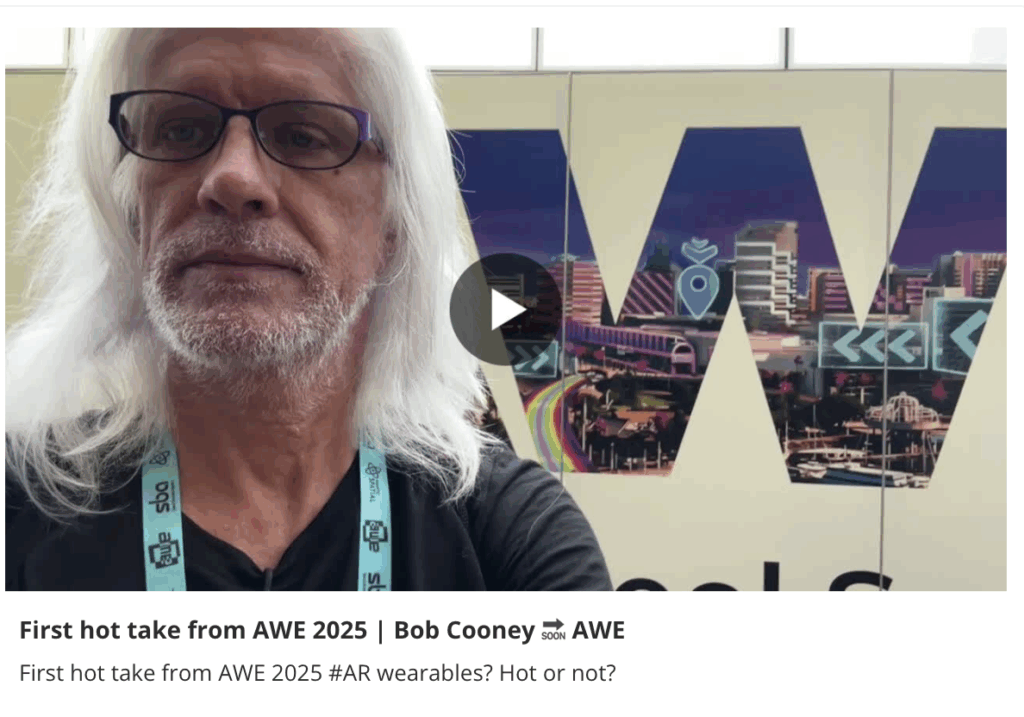
I assumed it would be the same this time, especially after SNAP founder Evan Spiegel announced their v6 Snap Specs coming next year, declining to specify any of these stats. But in the very next session, XREAL broke from the pack.
ABOVE: XREAL’s external battery pack
I am sure Meta will be right behind XREAL at Meta Connect 2025, coming up in September. It would not surprise me to see them release an update in the coming days or weeks, as they often like to steal the thunder from their competitors.
Project Aura is the first legitimate AR glasses to announce the adoption of Android XR as its platform and operating system. Google and Samsung are sure to follow soon.
ABOVE: Project Aura will use the Android XR operating system.
I mentioned above that Snap (the company that brought you Snapchat) announced a new consumer launch of its Spectacles line of AR glasses developer kit they demonstrated at the VR Arcade and Attractions Summit in March. They were all over the Long Beach Convention Center offering demos. I tried the new game from Enklu’s Verse Immersive, which is switching from HoloLens 2 to Spectacles. It was a much better experience due to the comfort of the glasses and the hand tracking. The objects lacked depth of field, though, which made everything a bit flat.
The more interesting demo was outside on a makeshift basketball court. Sporting a pair of Spectacles, I shot free throws. The glasses used machine learning algorithms to track both the basketball and the basket. When a shot went in, I was rewarded with points on a virtual scoreboard, along with some fireworks. I could also see the trajectory of the ball’s arc, making it a viable training tool. Snap is working on LBXR features, so I expect to see a host of new applications emerge with their consumer launch next year.
Leland Hedges, head of Enterprise Business at Pico, devoted his entire keynote to showcasing about twenty different LBE use cases for the new Pico 4 Ultra Enterprise. He leaned heavily on their success in the China market, where they’ve launched a new end-to-end platform to handle everything from content creation to location ops. There is no word yet on whether they will release something similar in the West.
Pico has been clawing market share away from HTC VIVE for the last year, and they seem intent on pressing their momentum towards market domination.
ABOVE: Leland Hedges promotes Pico’s success in China as the leading LBE solution for XR
Hero Zone recently launched in China, utilizing the Pico 4 headset, and is experiencing great success. They’ve already lit up 60 locations there in a few months. It’s unusual for a Western company to get such fast traction in China, which is a testament to the quality of the Hero Zone solution.
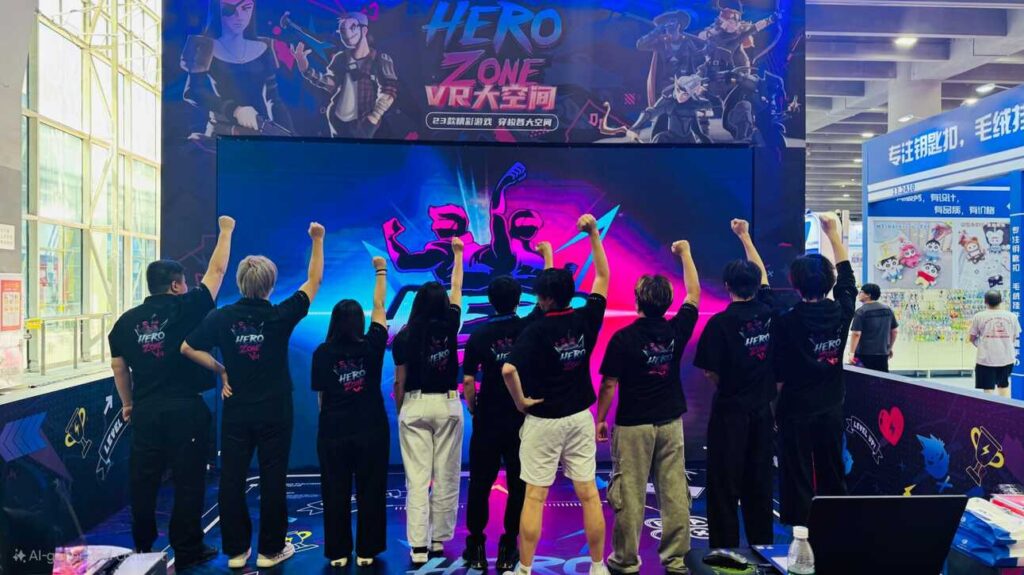
ABOVE: The Hero Zone China Team after the recent launch.
Searching the AWE conference agenda for Storytelling turned up 22 different panels and presentations. The biggest was probably by Vicki Dobbs Beck, VP, Immersive Content Innovation for Lucasfilm & ILM, titles From Storytelling to StoryLIVING: Our New Reality. New videos are being posted to the official AWE YouTube Channel Daily.
While we didn’t garner main stage cred, our little panel featured some of the most experienced people delivering storytelling content to the LBVR market. We discussed two elements,
We recorded the panel and will release it on the Inside VR podcast soon.
ABOVE: From Right to Left: David Bardos from Univrse, Jenna Seiden from Felix and Paul, Emmy-award winning narrative director Joshua Rubin, and Jeffrey Travis from Positron. Oh, and Bob Cooney.
I don’t go to the awards shows, as they bore me to tears. But I happened to run into Jan Goetgeluk and the team from Virtuix, fresh off their win at the AWE Auggie Awards. Omni One won the award for Best Interaction Product. Jan has been working on this product for years, and it’s good to see his dedication and innovation rewarded. Now his Omni Arena VR Bobble has some company in the trophy case (or the Pool Room – IYKYK).
ABOVE: Jan, Bob, and the Auggie
Joe Mares has been working on a compact free-roam VR haunted house for the last couple of years. He has tested it live in some large FECs, and it’s proving to be easy to use, reliable, and super fun. It’s a 2.5-minute walk-through experience that takes up approximately 130 square feet. Sixty people per hour can go through, and it’s getting $5+ per person. It requires one attendant, but at $300 an hour, labor rates are under 20%. And with a double track, you can double the throughput with still just one attendant.
Here’s the end of the video of me doing it. Turn up the volume (but it’s NSFW, so headphones might be warranted.) It requires some stage setting to be an attraction, but it only requires a few Quest headsets ($500 each) and a computer. If you’d like more information, please feel free to reach out, and I’ll be happy to connect you.
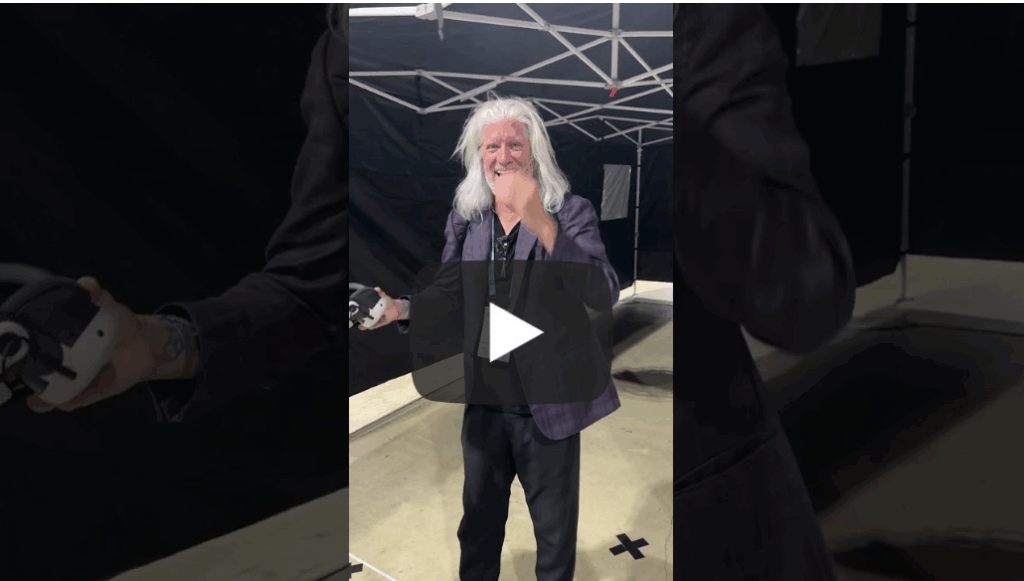
ABOVE: Haunted VR Attraction…. Wait for it
In the next Dropping In, I plan to tackle what’s happening in the world of AI. It’s quite terrifying. Until then,
Stay Immersed,
Bob